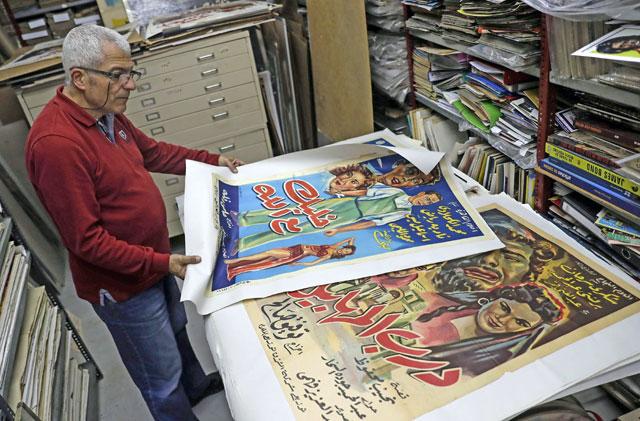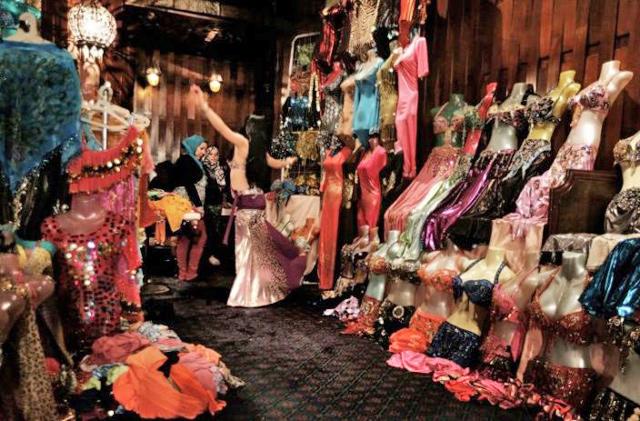You are here
In Lebanon, vintage film posters question Western cliches
By AFP - May 13,2019 - Last updated at May 13,2019

Abboudi Abu Jawdeh shows part of his vintage cinema poster collection at his office in the Lebanese capital Beirut, on April 23 (AFP photo)
BEIRUT — A pale woman rides through the desert, flanked by armed men on camels, a palace shimmering in the distance. This is Lebanon — or so someone thought in the 1950s.
At a Beirut cultural centre, Lebanese film buff Abboudi Abu Jawdeh is exhibiting vintage film posters from his collection that show off a lost art, but also offer insight into decades of Western cliches of the Arab world.
On a guided tour, the collector gestures towards the desert scene, which is an Italian poster for the 1956 French movie “The Lebanese Mission”.
“This is from the artist’s imagination,” the 61-year-old says, standing beside the image featuring the camel riders and a palace resembling India’s Taj Mahal.
“He knew Lebanon was in the east, so he did this,” he says, despite the country having ski slopes and sand only on its Mediterranean beaches.
Abu Jawdeh moves along to another poster for the same film, this time featuring an oil well.
“I hope we will have some,” he says, as his country only this year starts exploration for the hydrocarbon off its coast.
A glance at the film’s synopsis reveals more inconsistencies.
A Frenchman falls for the daughter of a Lebanese nobleman while in Lebanon hunting for uranium, a metal not mined in the country.
‘Orientalists’
Abu Jawdeh first began collecting posters in his teens, starting with films starring American actors Steve McQueen and Clint Eastwood.
Visiting old cinemas in Lebanon and across the region, he unearthed a world of images — for more foreign films, but also thousands of prints advertising films from the Arab world.
Some of his finds in this rare collection date back to 1930s Egypt or Lebanon in the late 1950s.
Today he owns some 20,000 posters, stacked up to the ceiling at his publishing house, their bright colours shielded from the sunlight.
Different versions of the same poster are especially revealing — indicating which country required a change in a film title or a bra to be painted over a naked back to avoid offence.
But as he collected, Abu Jawdeh also started noticing a trend in some of the Western posters for films set in the Middle East.
They “resembled the paintings that Orientalists painted of the region in the 18th and 19th centuries”, he says.
Dozens of these images are on show until May 25 at the Dar Al Nimer cultural centre in Beirut.
Titled “Thief of Baghdad”, after a much-remade fantasy film from 1924, the show is replete with turbaned men, flying carpets, snake charmers and belly dancers.
There is Elvis Presley starring in a film called “Harum Scarum”, and a British-Egyptian comedy reportedly inspired by late Egyptian King Farouk’s unrequited passions for a belly dancer.
With captions summarising often outlandish screenplays, the posters show a fantastical world far removed from the modern Middle East, but also gross misrepresentation.
‘We’re not all belly dancers’
“Come to savage seething Arabia on a terror search for forbidden treasures of the ages,” reads the tagline for the 1957 action film “Forbidden Desert”.
Late Lebanese-American academic Jack Shaheen analysed portrayals of Arabs in Hollywood films.
He watched more than 900 movies spanning a century to the early 2000s, and found only 5 per cent showed Arab roles as “normal, human characters”.
Instead, a whole people was systematically dehumanised or vilified. Often, all Arabs were Muslims, and all Muslims were Arabs, wrote the researcher of Christian descent.
Female characters were largely belly dancers or enchantresses, silent “bundles of black” or “terrorists”.
Abu Jawdeh says that he and others may not have always rejected such depictions
“We too liked seeing a belly dancer,” he says.
But the public now will likely see the posters differently, he adds, welcoming a fresh-eyed reevaluation of how the West has viewed the Arab world.
“They need to see them to reexamine these human relations,” he urged.
Round the corner, Rabbah Faqih, a masters student in archive management, looks at a poster featuring a skimpily dressed actress.
“I’m all for a good expressive poster to draw people in, but I’m against commodifying women like this,” she says.
“We’re not all belly dancers in Lebanon,” says the 30-year-old, dressed in a long black robe, her hair covered.
Related Articles
MOSCOW — Before the launch of Russia’s military campaign in Ukraine, printer Sergei Besov was part of a burgeoning art scene centred around
CAIRO — At a Cairo wedding hall, Russian belly dancer Anastasia Biserova shimmied to the dance floor in a bright, high-slit skirt and an ela
BEIRUT — "Three, two, one, action!" shouts Syrian refugee Mostafa Abdallah, 11, energetically directing his fellow child actors in a musical












